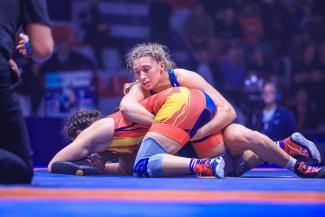#WrestleTokyo: Aleksanyan, Evloev Remain on Collison Course
Monday, August 2, 2021 - 04:26 By Vinay Siwach

CHIBA, Japan (August 2) --- If there was a manual about how to wrestle at Olympic Games, performances of Musa EVLOEV (ROC) and Mohammadhadi SARAVI (IRI) on Monday would be the top ones in it.
On the second day of wrestling at the Tokyo Olympics, the two reached the semifinals at 97kg Greco-Roman weight classes as expect on either side of the bracket. While world champion Evloev will wrestle Tadeusz MICHALIK (POL) in the semifinal, Saravi faces defending Olympic champion Artur ALEKSANYAN (ARM). It will be a rematch of the 2019 Worlds quarterfinal which the Armenian won 4-3.
The morning session at the Makuhari Messe Hall in Chiba was highlighted with stunning throws, lifts and some quick techniques as Greco-Roman 77kg and 97kg and women's wrestling 68kg weight classes got their semifinalists.
Evloev was in different as he wrestled at will, controlling most of the action even if he did not close out the bouts with technical superiority.
He began the day with a 3-1 win over Giorgi MELIA (GEO) and then Alex SZOKE (HUN) was dumped 6-2 in the quarterfinals. His opponent in the semifinal, Saravi was more dominant as he began with a 9-0 technical superiority win over Adem BOUDJEMLINE (ALG) before securing a 6-0 win over Kiril MILOV (BUL).
 Artur ALEKSANYAN (ARM) reached the semifinal at 97kg. (Photo: UWW / Martin Gabor)
Artur ALEKSANYAN (ARM) reached the semifinal at 97kg. (Photo: UWW / Martin Gabor)
Aleksanyan had some hiccups on the way but he was clinical in the 4-1 opening round win over Uzur DZHUZUPBEKOV (KGZ). His strategy to begin slow against Arvi SAVOLAINEN (FIN) played out perfectly and he won 5-1. He decided to give up the passivity point in the first half but got one in the second. He used two guts from par terre for the win.
Tadeusz MICHALIK (POL) reached the semifinal after a hard-fought win over Tracy HANCOCK (USA). Hancokc will rue the challenge that his corner throw looking at the final scoreline of 4-3.

At 77kg, world champion Tamas LORINCZ (HUN) had a quite morning as he won his first bout via forfeit while the second was an easy 3-1 win over Shohei YABIKU (JPN). But the Hungarian will need to be at the top of his game as he faces World bronze medalist Mohammadali GERAEI (IRI) in the semifinal.
Geraei was training 5-1 against Bozo STARCEVIC (CRO) but he kept the pressure and forced a pushout which was scored fleeing by the referees giving two points to Geraei. With less than 25 seconds left, Geraei went for his trademark jump over the head move and landed Starcevic in exposure position to get two points. At 5-5, he held the criteria for the last point scored.
On the other side of the bracket, young star Akzhol MAKHMUDOV (KGZ) is looking to become his country's only third Greco-Roman Olympic finalist as he reached the semifinal against Karapet CHALYAN (ARM).

Makhmudov made a mess of Rafig HUSEYNOV (AZE) in the quarterfinal, launching him for a big throw and two exposure to win 9-1. He won his first bout 11-0.
Chalyan upset 2018 world champion Aleksandr CHEKHIRKIN (ROC) 2-1 after he humbled Jalgasbay BERDIMURATOV (UZB) 5-0 in the first bout.
In the women's section, world champion Taymra MENSAH STOCK (USA) in on her way to the final at 68kg as he made her way through a minefield to reach the semifinal against 2018 world champion Alla CHERKASOVA (UKR).
Mensah Stock began her day with a 10-0 shutout of defending Olympic champion Sara DOSHO (JPN). In a rematch of the 2019 World Championships quarterfinal which the American won, she used her double-leg takedowns to leg lace to great affect. She then avenged her Matteo Pellicone final loss to Feng ZHOU (CHN) with another 10-0 win.

Cherkasova has also not given up a single point in her two bouts, beating Agnieszka WIESZCZEK KORDUS (POL) 11-0 and a victory via fall over Anna SCHELL (GER).
Mongolia had a semifinalist as Battsetseg SORONZONBOLD (MGL) set up a clash against Blessing OBORUDUDU (NGR). The two had tough quarterfinals but hung in there to come out as winners.
Soronzonbold handed Khanum VELIEVA (ROC) a 8-5 defeat in the quarterfinal but it was her opening round bout against Koumba LARROQUE (FRA) where she had to come up with a big four in the final moments and win via fall. The French wrestler was leading 3-0 at that time.

Oborududu also put on a show as she first handed Elis MANOLOVA (AZE) a 13-2 thrashing before carving a tough 3-2 win over Meerim ZHUMANAZAROVA (KGZ) in the semifinals.
Wrestling will return for the evening session at 1815 hours local time here in Japan.


Share your thoughts.
Comments